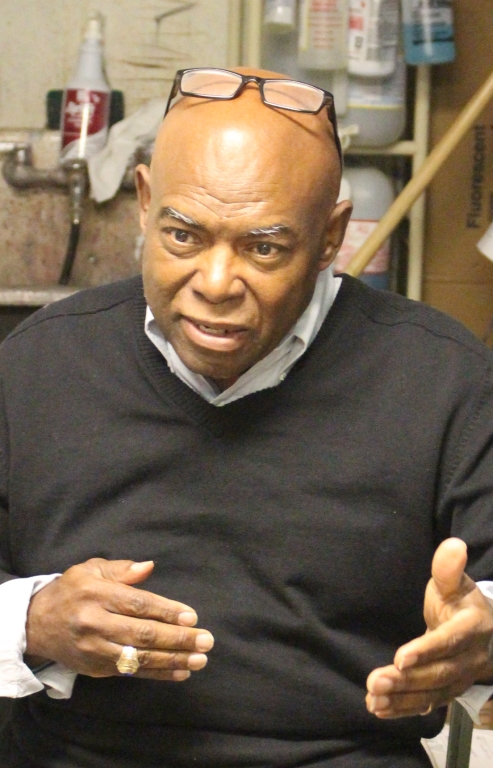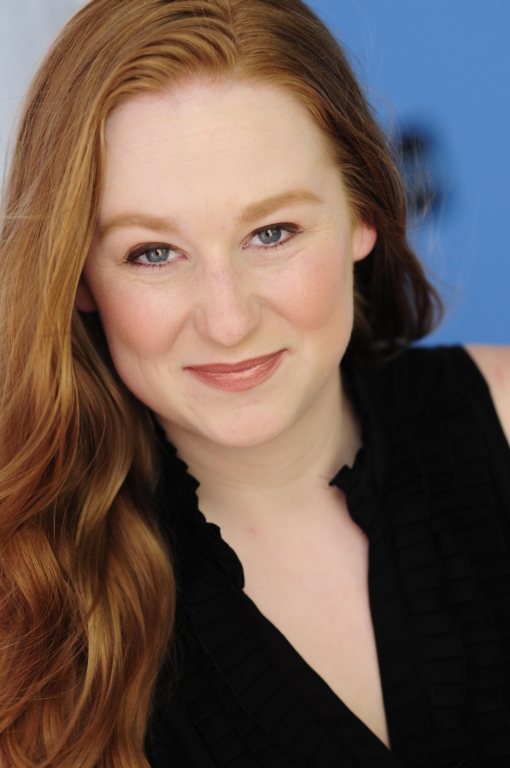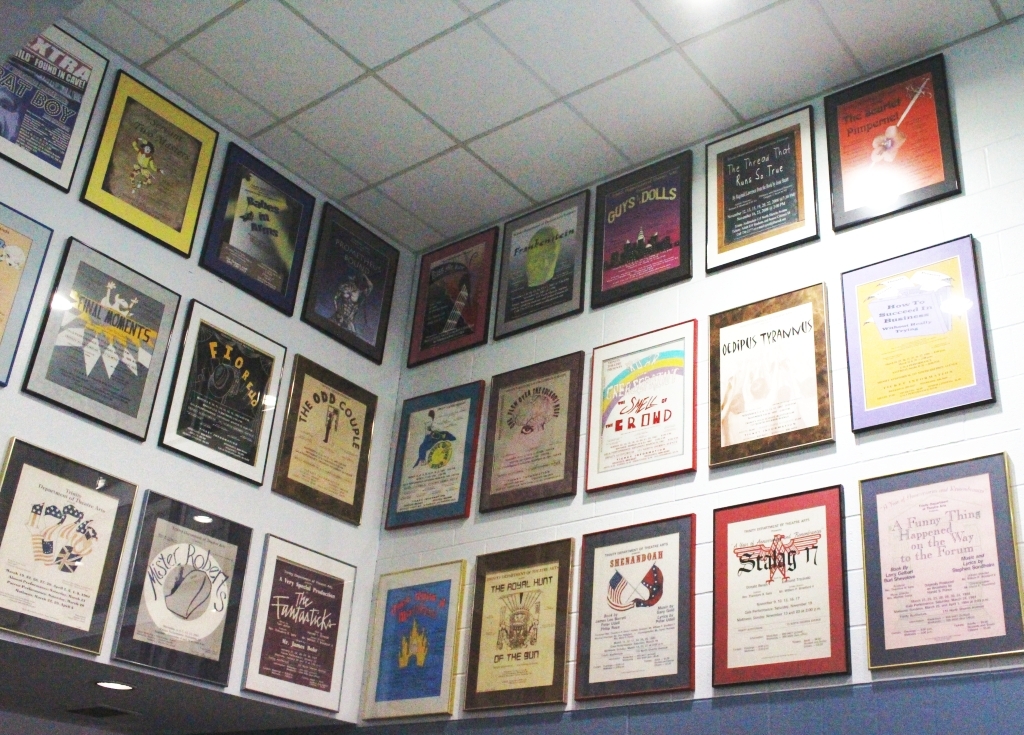Sharing a Love of Theatre for Half a Century
A small portion of the Trinity plays directed by Mr. William P. Bradford II.
May 15, 2017
It’s a Thursday afternoon in the Trinity Auditorium and there are students on stage rehearsing for an upcoming show. Naturally, Mr. William P. Bradford II is in the auditorium as well. For 45 years he has worked with Trinity plays, two or three per year, but this year is different.
Bradford agreed to talk about his time with Trinity’s theatre program, which came to an end this spring with the production of The King and I.
He is soft-spoken. It’s hard to imagine him raising his voice at an actor. His calm demeanor gives the impression that he is content with impending retirement. Bradford has been an actor ever since he was a child, and he has been working in theatre ever since.
He said his well-read father helped introduced him to the “beauty of actors” through films and theatrical plays. Growing up, he said, there weren’t many opportunities to get involved with theatre in his schools, but he could “do things around town.” He became an English drama major at Bellarmine College and performed there.
As he was finishing college, he realized that the quality of theatre in Louisville was lacking.
“There were not a lot of people, except at the university and some other places, who really knew theatre,” Bradford said. “I don’t mean, they had an interest, ‘Ooh, let’s put on a play,’ but people who really understood the theory, the literature, the history.”

Mr. William P. Bradford II
Bradford wanted to introduce people to the knowledge of theater he had acquired through his experiences and studies. “There’s 3,000 years of literature. Someone is constantly creating. It is my obligation as a teacher and a director to know the literature. You are constantly learning,” Bradford said. “One of my obligations to the students is to give them good literature that is challenging. It shouldn’t be easy.”
Bradford said there should be no such thing as “high school theatre.”
“He believes that there is little kid theatre, and then there’s professional theatre. He believes that high school theatre should be professional, and that the actors in it are just as talented as those who are professional,” Trinity sophomore Max Urton said.
Bradford sought to raise the bar for what should be expected from high school theatre programs, that students are old enough to participate in serious productions.
Bradford said, “‘Oh, weren’t they cute; they were high school students!’ By the time you get to be 16 years old, ‘cute’ is over. Produce something worthy. Produce something worthy of the actors’ intellects and their passions, and worthy to be put out to an audience for their intellects and their passions.”
Bradford taught at Bishop David High School (now Holy Cross) from 1967 to 1972 and completed his graduate work at Notre Dame. The Rev. Ted Sans, a former colleague at Bishop David who had been reassigned to work at Trinity, offered Bradford a position at Trinity.
In 1972, Bradford started teaching English and co-directing theatre with Sans. Bradford said, “I was a dynamic English teacher. If we went into something, I went all the way into it.”
Trinity’s productions were held in a classroom and the hallway on the third floor of Old Trinity. “I would do a show, he (Sans) would do a show, I would do a show, he would do a show. Finally, he sat me down for dinner and said, ‘I want you to direct, and I will produce,’” Bradford said. “I said, ‘I want you to think about this before you say it, because you’re asking me to commit to something, and once I commit, I go all the way.’”
Bradford said the challenges he faced had nothing to do with the work. “I always enjoyed the work. My work was my hobby; my hobby was my work. I never resented getting up any morning and going to school. When I was doing two schools –here (Trinity) and the (Youth) Performing Arts School — at the same time, I would have days that would go early in the morning to very late at night. I was driven; I had to be a theatre director.”
As time went on, the theatre program at Trinity began to grow, with productions moving from the third floor of Old Trinity to the auditorium in 1980. “It was not a replacement; it was an evolution,” Bradford said.
The key components to the evolution, according to Bradford, were a close working relationship with Sans, a strong relationship with students, and “their willingness to do.”
As the theatre program at Trinity evolved, one thing remained consistent: the draw students felt toward theatre.
“I never had a lack of students” Bradford says. “I think at first they see something. They see people do this. Standing in front of them are living, breathing human beings; some of them are fascinated by that. Some of them are fascinated by people taking them, that act of taking — the experience of seeing living human beings transport you to some other place.”
One of the things that helped Bradford develop as a director was seeing the impact theatre has on people — both the actors and the audience.
Urton said, “I only thought of (theatre) as a recreation. After Mr. Bradford came along, I really thought of it as an actual thing that I want to pursue in the future.”
One of the joys of the job, according to Bradford, is the opportunity to see students develop as actors.
“The passion has grown,” he said. “It’s an amazing thing to see how hungry some of them are. They encounter an idea; the idea is formed into script. That script is put into the mouths of human beings, and then they start to hear it. The moment it begins to be spoken and people are listening to it and are going through the process — intellectual and emotional process — then comes the drama.

“Once you add someone to listen who has not heard it over and over again, and you can excite them — that continuous process has made me grow. It’s an enlightenment seeing the students do that. It never grows old. Some of them go three to four years with me. Why? Well, they’re growing constantly. They’re getting closer and closer to the truth — about the art and themselves.”
“(Mr. Bradford) brought passion to theatre,” Trinity senior Loui Chang said. Chang described Bradford’s style of directing as the “epitome of a person teaching arts.”
One of the things that students mention when asked about what Bradford taught them about theatre is that acting is as much an intellectual process as it is an emotional one.
Chang said, “The one you ought to do, as an artist, is to tell the true story. As actors, to do so, we have to become those people (the characters). We have to go through an intellectual part before we go into an emotional part so that the emotion becomes real. It’s not about pretending; you have to be those people. It’s not just about memorization. Once you begin to understand the character and fully adapt to the characterization, the character just becomes real.”
Trinity senior Evan Pride said that Bradford taught him the “fundamentals of theatre. He points out a lot of flaws that high school students typically have in their acting. You’ve got to push your verbs, plant your feet, only move with purpose, motivate everything. Every scene, not only the entire play, has a story arc. Every single thing you do on stage goes to telling that story.”
Trinity junior Jack Wolfram says that he admired Bradford’s willingness to give everyone a chance on stage. Students who had been acting since they were two years old would share a stage with students who walked into an auditorium for the first time two days ago.
Wolfram said, “As someone who had never acted before his freshman year, I’d say Mr. Bradford really made me into the kind of actor that I never envisioned myself becoming. He taught me everything I needed to know.
“My favorite Mr. Bradford memory was (from) my freshman year, when I was a quiet and reserved kid because it was my first-ever show. Apparently I wasn’t being loud enough, so he made me stand on a chair and scream for five straight minutes. I’m talking, like, 110-pound scared freshman going ‘Aaaaahhh’ and he’s like, ‘Louder.’ I was screaming my heart out on a chair; then he said, ‘That was good; now do your lines.'”
Many students feel that Bradford’s emphasis on specifics and small details are the components to directing theatre.
“He’s all about having the little things correct, because that is what makes it seem professional. It can’t seem too broad, but it can’t seem to ‘nitpicky,’ either. You have to find a nice balance in between,” Wolfram said.
Pride describes Bradford’s style as “unorthodox” and “experimental, even though he was a traditionalist. (Mr. Bradford) can be harsh, not withholding. Very truth-driven. He’ll be very honest and truthful with you. It’s good to have someone tell you if what you are doing is good or not.
“It is not unlike Mr. Bradford after a run-through of a scene to say, ‘That was awful; that was the worst thing ever.’ He’ll oftentimes stop you during a scene and say, ‘There’s no energy.’”
Urton said that one of the pillars of his teaching is discipline. “You learn from yourself more than you do from him because he tells you to do everything on your own and figure it out on your own.”
Chang said, “Yes, he can be a disciplinarian. Yes, he can be seen as a traditionalist. But at the same time, he understands how students feel. He really opens himself to other people and really tries to make them understand how he feels about this whole business.”
Bradford’s approach to picking plays depended more on the students than his own desires. “You never pick material that just the director likes. You pick material to put on the students so that it would fit them. Look at all the posters (in Trinity’s Auditorium). They were chosen for the students here at the time, not because I liked it, not because Father Sans or Mr. Sysol liked it.”
Bradford has impacted countless students over the decades. Chang is one of those students. Chang was a freshman when he met Bradford. He spoke broken English but was eager to learn.
Bradford said, “He would ask me to correct his English. He found out I had been an English teacher and then he really started asking me. I always had two dictionaries on my table. He would say, ‘What’s this word? This is only a microcosm of what has happened to many students here. ‘What is this, Mr. Bradford? What is this play? What is this theatre? What are these words?’”
Chang said that Bradford has been a life-changing mentor to him. “He truly understood me. He never gave up. Whenever he was working with me, he was patient. If I were struggling or not having a good day, he was always concerned about me. He’s become so much of an influence of my life that his teachings naturally come out. I could never ask for a better mentor than Mr. Bradford.”
Bradford’s retirement after the The King and I marks the end of his 45 years of directing theatre at Trinity.
Urton said, “A lot of people have been really sad that he’s leaving. A lot of the seniors look up to him.”
“Not having him around will be weird. His philosophies, the things he taught us will carry on,” Pride said.
Ms. Kate Reedy will be the replacement for Bradford. She has been involved in theatre her entire life — she was one week old when she was carried into a theatre for the first time. She was a student at the Performing Arts School and performed in plays at Trinity. She has also worked as a choreographer alongside Bradford in Trinity productions.
“Mr. Bradford held me when I was a month old, and he has always been a part of my life. Thus, he has not only impacted my theatre life, but my personal life as well,” Reedy said. “He has taught me to always be curious, always be interested to learn and develop as a person and a theatrical artist, and to always strive for greatness.”
Reedy said there is little difference between working with Bradford as an actor and working with him as a choreographer.
She said, “As an actor, he was always pushing me to question my thinking, my motivation, my movement, etc. As a choreographer, he has done the same. I would throw out these crazy ideas of what I wanted to accomplish in a dance number, and Mr. Bradford would look at me and say, ‘All right, why?’ Not that he really needed an explanation, but he wanted me to continue to grow as a thoughtful artist and to develop my idea further into an actual reality.”
One of Reedy’s favorite instances of Bradford challenging her as a choreographer occurred during the production of You’re a Good Man, Charlie Brown, her first musical as a choreographer at Trinity.
“(I was) thinking Snoopy’s number in the second act needs to be a tribute to Bob Fosse. The number is traditionally done with only Snoopy laying on the top of his dog house, but my idea was to have every girl in the show behind him as back-up dancers,” Reedy said. “When I first pitched the idea to Mr. Bradford, he asked me many questions about how I was going to accomplish the look. After talking through the ideas and collaborating on several more ideas for the number, it became a hit. It is still one of my favorite numbers I have put up on Trinity’s stage.”
Many theatre students are enthusiastic about Reedy taking the role of director. Pride said that Reedy’s teaching style is comparable to Bradford’s.
“(She has) very high expectations and demands excellence. She is definitely going to carry the spirit of Bradford,” Pride said. “She is the sweetest person you’ve ever met. Until you start messing up your choreography.”
Reedy said, “I would have to say our methods are extremely similar. After all, Mr. Bradford is one of the directors who has trained me, and I have had more tutelage under him than any other director I have previously worked with.
“I think one of the major differences is that I would love to use a more contemporary use of all technical aspects rather than a traditional route, but again, that all depends on the show and the concept for each show. Strangely enough, Mr. Bradford and I have always had very similar directorial concepts for our shows.”
Reedy says that there is pressure to fill the role that Bradford left behind. “How do you follow a legend like Mr. Bradford? You don’t. You create a new path with the guidance and teachings he has taught me. I only hope I can bring the same amount of passion he did to this program and do every one of his and my students proud.”
Bradford expressed optimism about Reedy taking over. “Her experiences should do her well,” he said.
Reedy hopes that more students will join the program. Bradford expressed concerns about the decreased number of students that have been involved in the past few years, a trend that he cannot find an explanation for.
“Theatre is a wonderful place to learn lifelong skills, even if it is something you are only a part of in high school,” Reedy said. “There is a family-like bond that forms with every cast at Trinity, people you can continuously count on no matter what throughout your life. I hope more students will take the time to join us and to see this is not just a class, but an education, a family, and lifestyle that is obtainable by anyone who dares to try.”
Bradford’s time at Trinity has left him with a legacy that lives on in the hearts and minds of those involved with him. Even students who were not involved with theatre can glance at the vast array of posters on the wall of the auditorium and get an idea of the places Bradford has taken students and audiences.
“Unobtainable. Unforgettable. Unimaginable. There will never be another Mr. William P. Bradford II. What he has accomplished for this school, let alone his students is absolutely magnificent. He built this program to be one of the best in the city for all Trinity students who have passed through his program,” Reedy said. “There was not a single person he did not take interest in or support. To watch him work one on one with a student and push that student to bring out the very best in himself as an actor and as a person is incredible and an experience I will never forget. As we say, he is one of the greats and will not be forgotten.”
At the end of it all, Bradford said he hopes that the work he has done at Trinity has had a positive impact on the students who worked with him. “What I’m hoping that the students who came in here remember is that I’m trying to cause positive change in their growing process — intellectually, aesthetically, emotionally. I hope that I’m making better people.”


